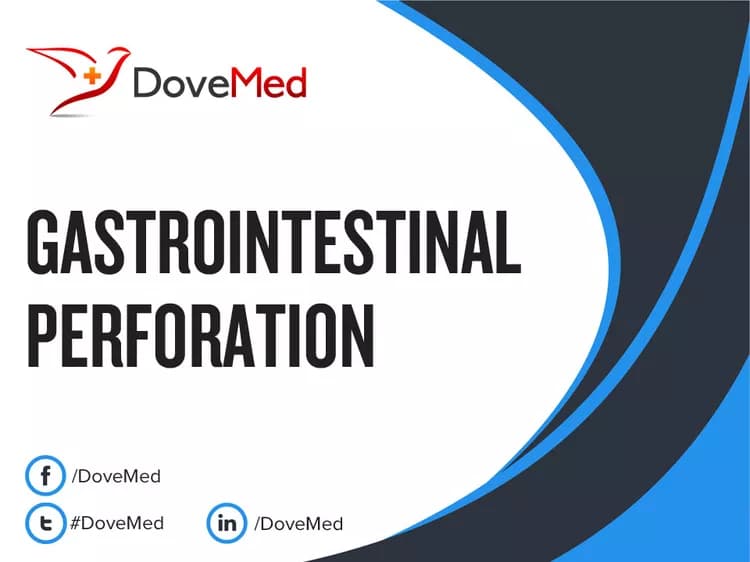What are the other Names for this Condition? (Also known as/Synonyms)
- Bowel Perforation
- GI Perforation
- Perforation of the Intestine
What is Gastrointestinal Perforation? (Definition/Background Information)
- Gastrointestinal Perforation indicates the development of a hole or perforation in the wall of the gastrointestinal (GI) tract, allowing its contents to leak into the abdominal cavity
- The Gastrointestinal Perforation may occur in any of the following regions or organs, along the GI tract:
- Stomach
- Small intestine
- Gallbladder
- Large intestine
- Rectum
- Common causes of Perforation of the GI Tract include an abdominal injury, inflammatory bowel disorders (affecting the intestine), any congenital abnormality of the intestine, surgery involving the abdominal organs, and cancer
- The signs and symptoms of perforation may include fever and chills, nausea, vomiting, severe abdominal pain and abdominal hardness, bloody stools, and many other conditions. Complications of the condition could include peritonitis and sepsis
- Gastrointestinal Perforation requires immediate care and is considered a medical emergency. It will require a surgery to stop leakage of the contents into the abdominal cavity. The earlier the diagnosis and treatment of Perforation of the Gastrointestinal Tract is carried out, the better is the prognosis
Who gets Gastrointestinal Perforation? (Age and Sex Distribution)
- Gastrointestinal Perforations can potentially affect any individual. There is no distinct gender predilection, both males and females are affected
- The condition is observed worldwide; all racial and ethnic groups may be affected
What are the Risk Factors for Gastrointestinal Perforation? (Predisposing Factors)
The risk factors associated with Gastrointestinal Perforations may include:
- Blunt trauma to the abdomen
- Stab wounds to the abdomen
- Cancer
- Routinely taking steroids, aspirin, or anti-inflammatory medications (which is common in elderly adults)
It is important to note that having a risk factor does not mean that one will get the condition. A risk factor increases ones chances of getting a condition compared to an individual without the risk factors. Some risk factors are more important than others.
Also, not having a risk factor does not mean that an individual will not get the condition. It is always important to discuss the effect of risk factors with your healthcare provider.
What are the Causes of Gastrointestinal Perforation? (Etiology)
Causes of Gastrointestinal Perforation may include the following:
- Injury or trauma to the abdomen
- Ulcerative colitis and Crohn’s disease; both are inflammatory conditions of the intestine
- Appendicitis
- Congenital abnormality of the intestine
- Any surgery involving the abdomen or the abdominal organs
- Diverticulitis
- Cancer
- Peptic ulcer
In very rare cases, the perforations can occur from endoscopy or colonoscopy injuries.
What are the Signs and Symptoms of Gastrointestinal Perforation?
A Gastrointestinal Perforation may present with the following signs and symptoms:
- Vomiting
- Severe abdominal pain
- Bloody stool
- Hardness of the abdomen
- Nausea
- Fever and chills
How is Gastrointestinal Perforation Diagnosed?
The diagnosis of a Gastrointestinal Perforation (also known as Perforation of the Digestive Tract) may involve the following:
- Complete evaluation of medical history along with a thorough physical exam
- The following tests may be usually performed to confirm the diagnosis:
- Complete blood count, which shows an increased white blood cell count
- X-ray of chest and/or the abdomen
- CT scan of the abdomen
Many clinical conditions may have similar signs and symptoms. Your healthcare provider may perform additional tests to rule out other clinical conditions to arrive at a definitive diagnosis.
What are the possible Complications of Gastrointestinal Perforation?
Complications associated with Gastrointestinal Perforation may include:
- Severe infection
- Internal bleeding
- Intra-abdominal abscess
Perforation of the GI Tract may also lead to peritonitis, which is a severe infection of the abdominal membrane. This result in signs and symptoms that include:
- Very tense abdomen
- Severe abdominal pain
- Rapid heart rate
- Exhaustion
- Shortness of breath
- Sepsis (poisoning of blood), which is a potentially fatal condition that occurs when the infection spreads throughout entire body
If either peritonitis or sepsis is suspected, then immediate medical attention must be sought.
How is Gastrointestinal Perforation Treated?
Gastrointestinal Perforation requires immediate surgical attention to restrict further movement or leakage of the gastrointestinal content into the abdominal cavity.
- The surgery can help:
- Repair the perforation
- Eradicate the source of infection
- In some cases, remove parts of the affected intestine
- If a part of the intestine needs to be removed, a colostomy will temporarily be performed to allow proper drainage. A colostomy is a procedure in which one end of intestine is opened into the abdominal wall. Stool moving through the intestine is drained into a bag attached to the abdomen
In rare cases of Gastrointestinal Perforation, the hole spontaneously closes and antibiotics alone may be sufficient treatment.
How can Gastrointestinal Perforation be Prevented?
A few preventive measures for Gastrointestinal Perforations include:
- Early detection and treatment of diseases that can potentially cause a GI Perforation
- Seeking immediate medical attention whenever a severe pain is felt in the abdomen
What is the Prognosis of Gastrointestinal Perforation? (Outcomes/Resolutions)
- Gastrointestinal Perforation is a life-threatening condition, which requires a speedy evaluation followed by surgical treatment
- A successful surgery is dependent upon the location, size, and duration of the perforation. The sooner the diagnosis and treatment that is carried out, the better is the outcome
Additional and Relevant Useful Information for Gastrointestinal Perforation:
The following DoveMed website link is a useful resource for additional information:
Related Articles
Test Your Knowledge
Asked by users
Related Centers
Related Specialties
Related Physicians
Related Procedures
Related Resources
Join DoveHubs
and connect with fellow professionals


0 Comments
Please log in to post a comment.